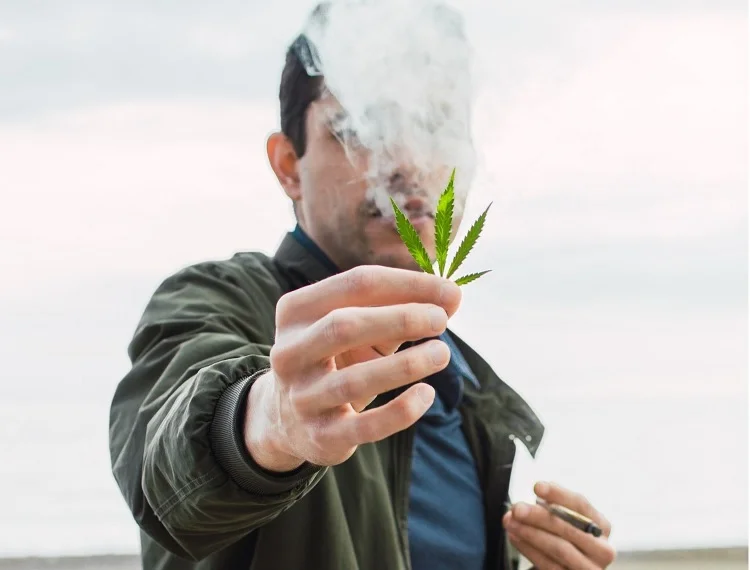Last Updated on: 10th December 2025, 06:40 am
What are the disadvantages of marijuana on oral health? Marijuana comes from a plant called cannabis sativa. It is a mixture of the dried leaves, flowers, stems, and seeds of this plant. Marijuana can have both harmful and beneficial effects depending upon its use; for example, there are multiple oils and ointments for managing muscle pain. It is also used medicinally for the treatment of diseases such as cancer, HIV, and epilepsy, among others.
Marijuana is used recreationally, as it contains substances that inhibit the central nervous system and provide a feeling of relaxation; but it can be addictive and lead to dependency, creating serious health and oral cavity problems.
If this topic seems interesting to you, we also have a guide about antiepileptic drugs on oral health.
This substance can be consumed in different ways:
• In the form of a cigarette
• Vaporizer
• Mixed with food
• Liquid extract
The use of marijuana has become more accepted worldwide. In fact, in some countries, it is legal to use it for both medical and recreational treatment. For example, in the United States, marijuana is one of the most consumed drugs by young people.
However, its use can generate some negative effects on the teeth, gums, and salivary glandsIn this article, the effects of marijuana on oral health and the risks associated with it will be exposed. In addition, advice will be provided to maintain good oral health while using this product.
What are the Effects of Marijuana on Oral Health?
The consumption of marijuana, especially smoking it, is associated with poor oral health. It can cause alterations such as dry mouth, gingival inflammation, and increased dental caries, which in turn cause diseases and conditions such as:
1. Xerostomia
A disease known as dry mouth is the most common effect of marijuana use; it is associated with a component called tetrahydrocannabinol (THC) that acts directly on the nervous system and decreases the formation of saliva.
Saliva has an immunological function, maintains a balance between the different species of microorganisms that inhabit the mouth, neutralizes the acids produced when eating food, keeps the mouth moist, and favors the mineralization of the enamel; For this reason, the absence of an adequate salivary flow contributes to an increase in bacterial plaque, cavities, and bad breath.
2. Periodontal disease
Marijuana consumption that causes inflammation of the gums, dry mouth, plaque accumulation, and poor oral hygiene can trigger periodontal disease.
Periodontitis, also known as gum disease, is a very common pathology that affects about 46% of the population of the United States. This is a serious infection that causes damage to the supporting tissues of the teeth (the gums and the alveolar bone), causing loosening of the teeth and possible tooth loss.
3. Tooth damage
After using marijuana, it is normal to feel hungry, specifically for foods high in sugar. These cravings are much stronger than those related to normal hunger since marijuana turns off the satiety center of the brain.
The primary reason behind tooth decay is the consumption of excessive carbohydrates, along with inadequate oral hygiene. Certain foods such as pizza, nachos, and French fries, along with others, contribute to the wearing away of the protective layer of the teeth known as tooth enamel. This information is relevant for individuals seeking enamel hypoplasia treatment.
4. Candidiasis oral
Marijuana decreases the activity of the immune system, which is why, accompanied by poor oral hygiene, its consumption favors the colonization of the candida albicans fungus, which engenders oral candidiasis.
This condition is seen as creamy white patches (lesions) on the tongue and inside the cheeks, which bleed if rubbed or scratched.
5. Oral cancer
When inhaling marijuana smoke at a high temperature it can burn or damage the inside of the mouth, most commonly affecting the tongue and the floor of the mouth. changes in oral tissues and cells can lead to a potentially malignant disease such as cancer.
During the early stages of oral cancer, white patches can appear anywhere in the mouth. This condition is called leucoplasia. It is very similar to oral candidiasis, so it is very important to visit a dentist for a diagnosis and treatment options before it is too late.
Recommendations for Maintaining Good Oral Health while Using Marijuana
The main recommendation is to stop smoking marijuana, or if you already have the habit, reduce your consumption. Over time, you will observe a notable improvement in the state of your oral health.
If it is not possible to stop using marijuana, whether for medicinal or recreational use, several strategies can treat and/or prevent oral problems:
• Maintain excellent oral hygiene: Use a good brush, floss, and a recommended toothpaste to properly clean teeth 3 times a day or after every time you eat.
• Avoid or reduce the consumption of sugars in foods or drinks
• Eat healthy food
• Drink a lot of water
• Treatment for dry mouth: Use saliva supplements, rinses, or medications that increase the amount of saliva; these must be prescribed by a dentist or doctor.
• Visit the dentist regularly: Whether you present any of the symptoms of conditions associated with marijuana use or not, it is suggested to make periodic visits to the dentist 3 or 4 times a year to assess the general state of the oral cavity and identify possible complications caused by the consumption of this substance.
The consumption of marijuana, whether medicinal or recreational, can cause various conditions in the oral cavity and facilitate the development of several diseases. It is recommended to visit the dentist periodically to assess the state of the teeth and gums and garner specific advice. It is done on a case-by-case basis.
Frequently Asked Questions
Does smoking CBD weed damage your dental health?
Yes, cannabis can affect your oral health. Its consumption, especially smoking, is associated with various oral health issues such as dry mouth (xerostomia), gum inflammation, increased dental caries, and a higher risk of periodontal disease and oral infections like candidiasis. The heat and chemicals from smoking cannabis can also damage the tissues inside the mouth, potentially leading to oral cancer.
Does smoking weed cause tooth decay or cavities?
Yes, marijuana affects dental health negatively. It can cause dry mouth by reducing saliva production, which increases the risk of dental caries and bad breath. Marijuana use can also lead to gum inflammation, periodontal disease, and a higher incidence of oral infections. The increased craving for sugary foods after using marijuana further contributes to the development of cavities and tooth decay.
Can dentists tell when you smoke weed?
Yes, and to maintain good dental health while using marijuana, follow these recommendations:
- Practice excellent oral hygiene: Brush your teeth at least three times a day or after every meal, using fluoride toothpaste, and floss daily.
- Reduce or avoid sugary foods and drinks: This helps minimize the risk of cavities.
- Eat a healthy diet: Focus on nutritious foods that support oral health.
- Stay hydrated: Drink plenty of water to help counteract dry mouth.
- Use treatments for dry mouth: Saliva substitutes, rinses, or medications that increase saliva production can be helpful. These should be prescribed by a dentist or doctor.
- Visit the dentist regularly: Schedule check-ups three or four times a year to monitor and manage any potential oral health issues related to marijuana use.
How does smoking weed affect the mouth and saliva?
The xerostomia, or dry mouth, is a common side effect of smoking cannabis. This occurs because tetrahydrocannabinol (THC), the active component in cannabis, acts on the nervous system and reduces saliva production. Saliva is essential for maintaining oral health, and its reduction can lead to increased bacterial plaque, cavities, and bad breath.
Share:
References
1. Cannabis Oral Health Effects. (s. f.). American Dental Association (ADA). https://www.ada.org/resources/research/science-and-research-institute/oral-health-topics/cannabis-oral-health-effects
2. Chaffee B. W. (2021). Cannabis Use and Oral Health in a National Cohort of Adults. Journal of the California Dental Association, 49(8), 493–501. https://www.ncbi.nlm.nih.gov/pmc/articles/PMC8415705/
3. Harpreet, S., Joseph, K., Wafaa, S., & Seunghee, C. (2019).Impact of Cannabis on the Port of Entry-Oral Tissues: An Overview. International journal of oral and dental health. https://doi.org/10.23937/2469-5734/1510098
4. Joshi, S. R., & Ashley, M. C. B. (2016). Cannabis: a joint problem for patients and the dental team. BDJ team, 3(8). https://doi.org/10.1038/bdjteam.2016.146
5. Morales, P. (November 14, 2022). Can CBD make a person’s mouth dry? Medical News Today. https://www.medicalnewstoday.com/articles/can-cbd-make-your-mouth-dry
6. Shariff, J. A., Ahluwalia, K. P., & Papapanou, P. N. (2017).Relationship Between Frequent Recreational Cannabis (Marijuana and Hashish) Use and Periodontitis in Adults in the United States: National Health and Nutrition Examination Survey 2011 to 2012. Journal of Periodontology, 88(3), 273-280. https://aap.onlinelibrary.wiley.com/doi/10.1902/jop.2016.160370
-
Nayibe Cubillos M. [Author]
Pharmaceutical Chemestry |Pharmaceutical Process Management | Pharmaceutical Care | Pharmaceutical Services Audit | Pharmaceutical Services Process Consulting | Content Project Manager | SEO Knowledge | Content Writer | Leadership | Scrum Master
View all posts
A healthcare writer with a solid background in pharmaceutical chemistry and a thorough understanding of Colombian regulatory processes and comprehensive sector management, she has significant experience coordinating and leading multidisciplina...


















